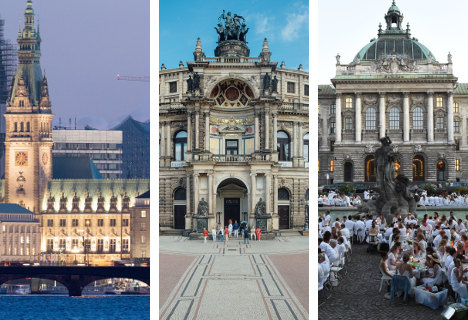The “city brand” (Stadtmarken-Monitor) survey of 5,000 people by branding consultancy Brandmeyer showed Hamburg edging ahead of Munich to take the top spot in public perception.
Pollsters asked ordinary people a range of questions covering what they thought of the city's reputation, quality of life, uniqueness, and how likely they would be to live there, visit, or recommend that a friend move there.
In the weighted results, the northern port city scored 7.9 points compared with an average of 5.9 for the 49 largest cities in the country, followed closely by Munich (7.3), Cologne (7.2), Dresden (7.1) and Freiburg im Breisgau (7.1).
And it was a favourite among all the age groups surveyed – under-29s, 30- to 49-year-olds and the over-50s.
Berlin seems to be losing its cool edge as a party city, placing just fifth among the under-29s but second in the 30 to 49 age range. In the overall rankings, the capital fell from third place in 2010 to now sixth place.
Meanwhile, south-westerly Freiburg im Breisgau – one of two top-ten cities with fewer than 250,000 inhabitants – came up top in the family-friendliness stakes, beating out Dresden, Augsburg, Hamburg and Münster.
Hamburg was seen as the friendliest city and was the place people said they were most likely to move to – although Munich continues to be the city seen as having the best reputation and highest quality of life.
And the Bavarian capital continues to rule the roost in perceptions of economic power, with the top five rounded out by Hamburg, Frankfurt, Stuttgart and Cologne.
There were no surprises in the beauty stakes either, with Dresden – the Saxon capital renowned for its many finely restored historic buildings strung along the Elbe river – tying with Munich and Hamburg for first place.

Pretty cities: Hamburg town hall and the Elbe river (l), the Dresden Semperoper opera house (m), and people dining al fresco in the gardens outside the Munich state court (r). Photos: DPA
Meanwhile, the bottom of the overall leaderboard was almost exclusively made up of cities in the densely-populated Rhine-Ruhr region of North Rhine-Westphalia, including Duisburg, Gelsenkirchen, Krefeld, Hagen and Bochum.
That might be because of those cities' low ratings in perceived quality of life among the survey respondents, with each of the cities scoring well below the average.



 Please whitelist us to continue reading.
Please whitelist us to continue reading.
Member comments